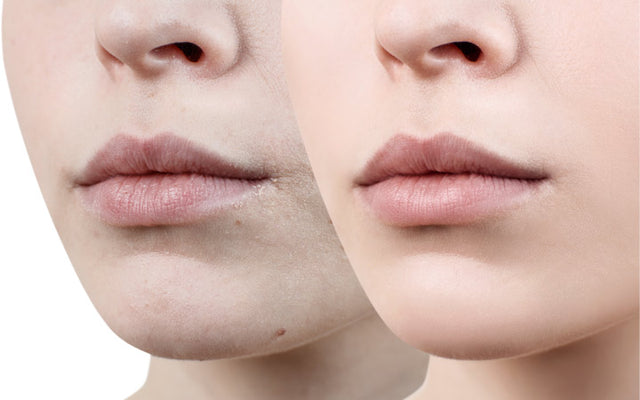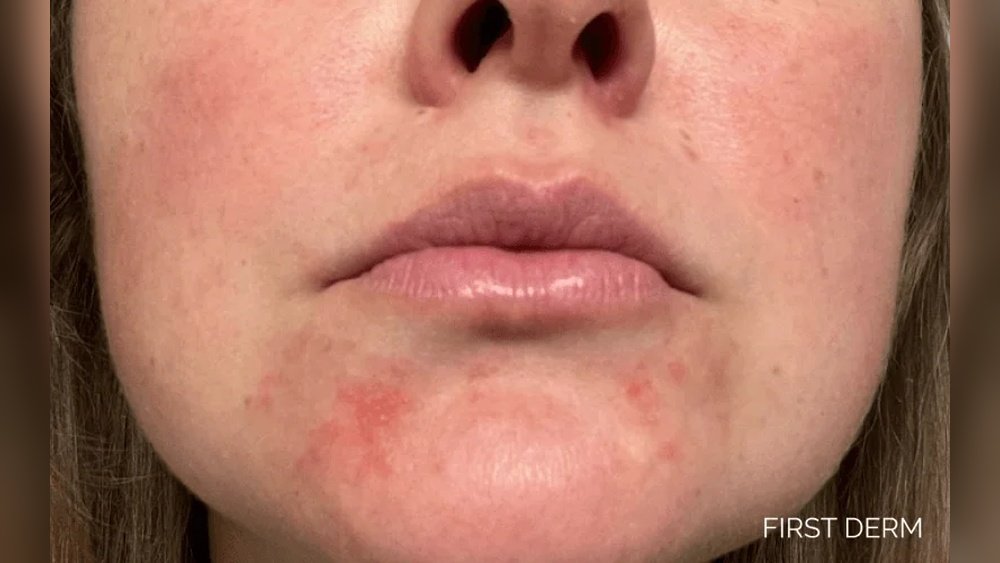Do you often notice patchy dry skin around your mouth that just won’t go away? It can be uncomfortable, annoying, and sometimes even embarrassing.
You might wonder why this keeps happening and what you can do to fix it. Whether the dryness feels tight, itchy, or flaky, understanding the causes and the right treatments can make a huge difference. You’ll discover simple, effective ways to soothe your skin and prevent those frustrating dry patches from coming back.
Keep reading to learn how to bring comfort and smoothness back to your skin around the mouth area.

Credit: skinkraft.com
Common Causes
Patchy dry skin around the mouth area is a common issue. It can cause discomfort and affect your confidence. Understanding the common causes helps in managing and preventing it effectively.
Environmental Factors
Cold weather and low humidity dry out the skin. Wind exposure can strip natural oils from your face. Indoor heating during winter also removes moisture. These factors lead to flaky, rough skin around the mouth.
Sun exposure without protection damages the skin barrier. This damage causes dryness and irritation. Drinking less water reduces skin hydration, worsening dryness.
Skin Conditions
Conditions like eczema and psoriasis often affect the mouth area. They cause inflammation and scaling, leading to dry patches. Perioral dermatitis is another condition causing redness and dryness.
These skin issues need proper diagnosis for correct treatment. Without treatment, dryness and irritation may worsen over time.
Irritants And Allergens
Harsh skincare products can irritate sensitive skin near the mouth. Ingredients like alcohol and fragrances often cause dryness. Toothpaste containing fluoride or strong flavors may trigger reactions.
Contact with allergens such as certain foods or lip balms also causes dry patches. Avoiding known irritants helps reduce skin dryness and inflammation.
Daily Skincare Tips
Taking care of patchy dry skin around the mouth needs a simple daily routine. Consistency helps improve skin texture and comfort. Using the right products and methods can soothe dryness effectively.
Gentle cleansing and proper moisturizing are key. Avoid harsh treatments that can worsen dryness or irritation. Focus on soft, nourishing steps to protect your skin barrier.
Choosing Gentle Cleansers
Select cleansers that are mild and fragrance-free. Harsh soaps strip natural oils and cause more dryness. Look for products labeled “hydrating” or “for sensitive skin.”
Use lukewarm water, not hot, to wash your face. Hot water can dry out the skin further. Cleanse only twice daily to avoid over-washing.
Pat your skin dry gently with a soft towel. Rubbing can irritate the delicate skin around the mouth.
Moisturizing Techniques
Apply moisturizer while your skin is still slightly damp. This helps lock in moisture for longer.
Choose creams or ointments with ingredients like ceramides, glycerin, or hyaluronic acid. These help repair and protect dry skin.
Use a small amount and spread evenly around your mouth area. Reapply moisturizer after washing or if skin feels tight.
For very dry patches, try layering a thin layer of natural oils like jojoba or almond oil over your moisturizer. This adds extra hydration and comfort.
Avoiding Triggers
Patchy dry skin around the mouth can cause discomfort and frustration. Avoiding triggers helps reduce irritation and allows skin to heal. Identifying products and habits that worsen dryness is key to managing symptoms effectively.
Fluoride And Mint Products
Fluoride in toothpaste can irritate sensitive skin near the mouth. Mint flavor often worsens dryness and redness. Avoid toothpaste, lip balms, and gums containing these ingredients. Choose mild, fragrance-free oral care products instead. This simple change can improve skin condition quickly.
Steroid Creams And Inhalers
Topical steroid creams may cause skin thinning and worsen dryness if used too long. Steroid inhalers can also trigger skin problems around the mouth. Stop using steroid creams without medical advice. Consult a doctor for safer alternatives to treat inflammation. Careful use prevents further skin damage and supports healing.
Home Remedies
Patchy dry skin around the mouth can feel uncomfortable and look unpleasant. Simple home remedies can soothe and heal this area effectively. These remedies use natural ingredients and healthy habits to restore moisture and protect your skin.
Natural Oils And Balms
Natural oils help lock moisture in dry skin. Coconut oil is a gentle option that soothes irritation. Apply a small amount around the mouth before bed. Olive oil also nourishes skin and reduces dryness. Beeswax balms create a protective layer that prevents moisture loss. Use fragrance-free balms to avoid further irritation. Regular use of these natural products can improve skin texture and softness.
Hydration And Diet
Drinking enough water keeps your skin hydrated from inside. Aim to drink at least eight glasses of water daily. Eating foods rich in vitamins A, C, and E supports healthy skin. Include fresh fruits, vegetables, nuts, and seeds in your meals. Avoid salty and spicy foods as they can worsen dryness. Good hydration combined with a balanced diet helps maintain smooth, healthy skin around the mouth.
When To See A Doctor
Knowing when to see a doctor for patchy dry skin around the mouth is important. Most cases improve with home care and simple treatments. Sometimes, the skin condition may need professional attention. Early medical advice can prevent complications and ease discomfort.
Persistent Symptoms
Seek medical help if dry skin around the mouth lasts more than two weeks. If symptoms worsen despite using moisturizers, it needs a doctor’s review. Cracking, redness, or scaling that does not improve signals a need for medical care. Doctors can diagnose underlying causes and suggest proper treatments.
Signs Of Infection
Watch for signs of infection such as increased redness, swelling, or pain. Pus or yellow crusts on the skin around the mouth require prompt medical attention. Fever or warmth in the affected area are also signs of infection. Infections need treatment with antibiotics to avoid spreading or worsening.

Credit: www.healthline.com
Medical Treatments
Medical treatments play a key role in managing patchy dry skin around the mouth. These treatments target the underlying causes and help reduce inflammation and irritation. Doctors often prescribe medications that calm the skin and fight any infection.
Choosing the right treatment depends on the severity and type of skin condition. Medical options include topical antibiotics and oral medications. Both aim to clear the skin and prevent worsening symptoms.
Topical Antibiotics
Topical antibiotics are creams or gels applied directly to the affected area. They help reduce bacteria and soothe inflammation. Common choices include metronidazole and erythromycin. These medicines work well for mild to moderate skin issues.
Applying the antibiotic as prescribed can speed up healing. Avoid using steroid creams, as they may worsen the condition. A gentle skincare routine alongside topical antibiotics supports skin recovery.
Oral Medication Options
Oral medications come into play for more severe or persistent cases. Doctors may prescribe antibiotics like erythromycin or tetracycline. These drugs fight deeper infections and control inflammation from inside the body.
Oral treatments often last several weeks. It is important to complete the full course to prevent relapse. Your doctor will monitor progress and adjust treatment as needed for best results.

Credit: skinkraft.com
Frequently Asked Questions
How To Treat Dry, Itchy Skin Around The Mouth?
Moisturize daily with gentle, fragrance-free creams or oils. Avoid irritants like fluoride toothpaste and steroid creams. Use mild cleansers and consult a doctor if symptoms persist or worsen. Treat underlying causes as advised for lasting relief.
How To Treat Perioral Dermatitis In Kids?
Treat perioral dermatitis in kids by stopping topical steroids immediately. Use doctor-prescribed topical antibiotics or calcineurin inhibitors. Avoid fluoride toothpaste and irritants. Maintain gentle skincare with fragrance-free products. Severe cases may need oral antibiotics. Always follow the pediatrician’s treatment plan and complete the full course.
How To Treat Perioral Dermatitis While Pregnant?
Treat perioral dermatitis during pregnancy by avoiding topical steroids and irritants. Use gentle, fragrance-free cleansers. Consult your doctor for safe topical antibiotics or alternative treatments. Maintain consistent skincare and follow medical advice to prevent worsening.
What Does Perioral Dermatitis Look Like?
Perioral dermatitis appears as red, patchy rash with small bumps around the mouth. It may cause dryness and mild itching.
Conclusion
Patchy dry skin around the mouth can cause discomfort and worry. Simple steps like using gentle moisturizers help soothe the area. Avoiding irritants such as certain toothpastes or creams reduces flare-ups. Persistent dryness may signal an underlying issue needing medical care.
Early treatment stops the problem from worsening. Keep your skincare routine mild and consistent for best results. Remember, healthy skin starts with good habits and proper care. Stay attentive to changes and consult a doctor if symptoms persist or worsen.
 Skip to content
Skip to content 